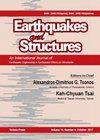Seismic probabilistic risk assessment of weir structures considering the earthquake hazard in the Korean Peninsula
IF 1.4
4区 工程技术
Q3 ENGINEERING, CIVIL
引用次数: 3
Abstract
Seismic safety evaluation of weir structure is significant considering the catastrophic economical consequence of operational disruption. In recent years, the seismic probabilistic risk assessment (SPRA) has been issued as a key area of research for the hydraulic system to mitigate and manage the risk. The aim of this paper is to assess the seismic probabilistic risk of weir structures employing the seismic hazard and the structural fragility in Korea. At the first stage, probabilistic seismic hazard analysis (PSHA) approach is performed to extract the hazard curve at the weir site using the seismic and geological data. Thereafter, the seismic fragility that defines the probability of structural collapse is evaluated by using the incremental dynamic analysis (IDA) method in accordance with the four different design limit states as failure identification criteria. Consequently, by combining the seismic hazard and fragility results, the seismic risk curves are developed that contain helpful information for risk management of hydraulic structures. The tensile stress of the mass concrete is found to be more vulnerable than other design criteria. The hazard deaggregation illustrates that moderate size and far source earthquakes are the most likely scenario for the site. In addition, the annual loss curves for two different hazard source models corresponding to design limit states are extracted.考虑朝鲜半岛地震危险性的堤防结构地震概率风险评估
考虑到运行中断带来的灾难性经济后果,堰结构抗震安全评价具有重要意义。近年来,地震概率风险评估(SPRA)已成为液压系统减轻和管理地震风险的一个重要研究领域。本文的目的是利用地震危险性和结构易损性来评估韩国堰结构的地震概率风险。第一阶段采用概率地震灾害分析(PSHA)方法,利用地震和地质资料提取坝址的灾害曲线;然后,根据四种不同的设计极限状态作为破坏识别准则,采用增量动力分析(IDA)方法对定义结构倒塌概率的地震易损性进行评价。因此,结合地震危险性和易损性结果,建立了水工建筑物的地震风险曲线,为水工建筑物的风险管理提供了有用的信息。发现大体积混凝土的拉应力比其他设计标准更脆弱。危险分解表明,中等规模和远源地震是该地点最可能发生的情况。此外,提取了两种不同危险源模型对应的设计极限状态下的年损失曲线。
本文章由计算机程序翻译,如有差异,请以英文原文为准。
求助全文
约1分钟内获得全文
求助全文
来源期刊

Earthquakes and Structures
ENGINEERING, CIVIL-ENGINEERING, GEOLOGICAL
CiteScore
2.90
自引率
20.00%
发文量
0
审稿时长
>12 weeks
期刊介绍:
The Earthquakes and Structures, An International Journal, focuses on the effects of earthquakes on civil engineering structures. The journal will serve as a powerful repository of technical information and will provide a highimpact publication platform for the global community of researchers in the traditional, as well as emerging, subdisciplines of the broader earthquake engineering field. Specifically, some of the major topics covered by the Journal include: .. characterization of strong ground motions, .. quantification of earthquake demand and structural capacity, .. design of earthquake resistant structures and foundations, .. experimental and computational methods, .. seismic regulations and building codes, .. seismic hazard assessment, .. seismic risk mitigation, .. site effects and soil-structure interaction, .. assessment, repair and strengthening of existing structures, including historic structures and monuments, and .. emerging technologies including passive control technologies, structural monitoring systems, and cyberinfrastructure tools for seismic data management, experimental applications, early warning and response
 求助内容:
求助内容: 应助结果提醒方式:
应助结果提醒方式:


